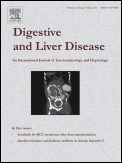
DIGESTIVE AND LIVER DISEASE
Scope & Guideline
Pioneering insights for a healthier tomorrow.
Introduction
Aims and Scopes
- Gastrointestinal Disorders:
Research on various gastrointestinal disorders, including inflammatory bowel diseases (IBD) such as Crohn's disease and ulcerative colitis, highlighting clinical management, surgical interventions, and innovative therapeutic approaches. - Liver Diseases:
Studies focusing on liver diseases, including hepatocellular carcinoma, hepatitis, and non-alcoholic fatty liver disease (NAFLD), with an emphasis on pathophysiology, treatment strategies, and outcomes. - Endoscopic Techniques:
Exploration of novel endoscopic techniques and technologies, such as endoscopic ultrasound (EUS), endoscopic mucosal resection (EMR), and artificial intelligence applications in endoscopy, to improve diagnostic and therapeutic efficacy. - Metabolic and Nutritional Aspects:
Investigations into the metabolic and nutritional aspects of liver and gastrointestinal diseases, including the impact of diet on disease progression and management. - Patient-Centered Care:
Research aimed at understanding patient experiences and outcomes, with a focus on quality of life, treatment adherence, and the psychological impact of gastrointestinal and liver diseases.
Trending and Emerging
- Artificial Intelligence in Gastroenterology:
An increasing number of studies are exploring the application of artificial intelligence for diagnostic and therapeutic purposes in gastroenterology, particularly in improving the accuracy of endoscopic procedures. - Telemedicine and Remote Monitoring:
The COVID-19 pandemic has accelerated the adoption of telemedicine and remote monitoring strategies, with emerging research focusing on their effectiveness in managing chronic gastrointestinal and liver diseases. - Microbiome Research:
There is a growing interest in the role of the gut microbiome in health and disease, particularly its impact on inflammatory bowel diseases and liver conditions, leading to novel therapeutic strategies. - Personalized Medicine Approaches:
Emerging research is increasingly focused on personalized medicine approaches, including pharmacogenomics and tailored therapeutic regimens based on individual patient characteristics and disease profiles. - Nutritional Interventions:
With the recognition of the impact of nutrition on disease management, there is a trend towards studying dietary interventions and their role in the treatment of liver and gastrointestinal disorders.
Declining or Waning
- Traditional Surgical Approaches:
There appears to be a declining emphasis on traditional surgical techniques for gastrointestinal disorders, as newer minimally invasive endoscopic techniques and medical therapies gain traction. - Basic Science Research:
Research focusing exclusively on basic science without direct clinical applications has seen a decrease, as there is a growing preference for translational research that bridges laboratory findings with clinical practice. - Conventional Imaging Techniques:
The reliance on conventional imaging techniques for diagnosis has waned, with a shift towards more advanced imaging modalities and artificial intelligence applications that enhance diagnostic accuracy. - Single-Agent Therapies:
The focus on single-agent therapies for complex diseases like IBD and liver disorders is gradually diminishing, with increasing interest in combination therapies and personalized medicine approaches.
Similar Journals
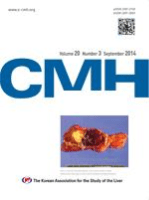
Clinical and Molecular Hepatology
Transforming the landscape of hepatology with cutting-edge studies.Clinical and Molecular Hepatology, published by the Korean Association for the Study of Liver, stands at the forefront of hepatology, offering a significant platform for research and innovation in liver diseases. Established in 1995 as an open access journal, it aims to disseminate high-quality research that spans the fields of hepatology, molecular biology, and medicine. With an impressive impact factor ranking it in the Q1 category for 2023 in both Hepatology and Molecular Biology, the journal facilitates a rich exchange of knowledge among professionals, researchers, and students globally. With its dedicated coverage from 2012 to 2024 and exceptional Scopus rankings placing it within the top 10% of journals in its field, Clinical and Molecular Hepatology is an indispensable resource for advancing the understanding and treatment of liver conditions. Located in Seoul, South Korea, the journal emphasizes rigorous peer review and is committed to enhancing clinical practice and molecular research, making it an ideal venue for groundbreaking studies in liver health.
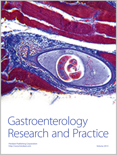
Gastroenterology Research and Practice
Transforming Insights into Improved Patient CareGastroenterology Research and Practice is a leading Open Access journal dedicated to advancing the field of gastroenterology and hepatology. Published by HINDAWI LTD, this journal offers a platform for researchers, clinicians, and healthcare professionals to share their findings and insights on cutting-edge topics in digestive health. With an ISSN of 1687-6121 and an E-ISSN of 1687-630X, it has established its significance within the academic community, evidenced by its ranking in the 2023 Scopus metrics, where it is positioned in the third quartile for both gastroenterology and hepatology disciplines. The journal is recognized for disseminating high-quality, peer-reviewed articles that contribute to the understanding of gastrointestinal disorders, therapeutic advancements, and innovative practices. Since its inception as an Open Access journal in 2008, Gastroenterology Research and Practice has removed barriers to access, ensuring that vital research reaches a global audience. This ongoing commitment to increasing accessibility, alongside its continuous publication from 2009 to 2024, underscores its importance as a resource for the academic and clinical communities striving to improve patient outcomes in digestive diseases.
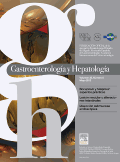
Gastroenterologia y Hepatologia
Connecting scholars to the forefront of gastroenterology and hepatology.Gastroenterologia y Hepatologia, published by Elsevier España SLU, is a distinguished journal dedicated to advancing the fields of gastroenterology and hepatology. With a publication history spanning from 1982 to 2024, this journal is recognized for its commitment to disseminating high-quality research and reviews that address critical developments in the diagnosis and treatment of gastrointestinal and liver diseases. Although it currently ranks in the Q3 quartile in both gastroenterology and hepatology based on the 2023 metrics, the journal continues to attract a global audience of researchers, healthcare professionals, and students eager to engage with the latest findings. The journal is accessible in both print and electronic formats (ISSN: 0210-5705), making its valuable insights reachable to a broad spectrum of subscribers. By fostering a platform for rigorous scholarly communication, Gastroenterologia y Hepatologia plays a vital role in shaping the future of research in these essential medical fields.
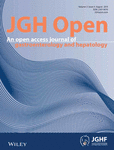
JGH Open
Empowering the Future of Gastrointestinal MedicineJGH Open is a prominent open-access journal dedicated to advancing knowledge in the fields of Gastroenterology and Hepatology, published by WILEY. Since its inception in 2017, the journal has served as a crucial platform for researchers, professionals, and students to disseminate innovative research findings and clinical insights. With an impact factor and Scopus rankings reflecting its steady growth—ranking in the 3rd quartile for both Gastroenterology (Q3) and Hepatology (Q3)—JGH Open is positioned within the competitive landscape of medicine. Its commitment to open access enhances the visibility and accessibility of high-quality research, ensuring that significant advancements in understanding diseases of the gastrointestinal tract and liver reach a broad audience. With a focus on collaboration and dissemination of knowledge, JGH Open aims to contribute to the global discourse and improve outcomes in gastrointestinal health.
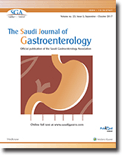
Saudi Journal of Gastroenterology
Championing open access to vital gastroenterological findings.The Saudi Journal of Gastroenterology is a premier platform dedicated to advancing research and clinical practice in the field of gastroenterology. Published by Wolters Kluwer Medknow Publications, this open-access journal has been serving the academic community since 1995 from its base in India. With an ISSN of 1319-3767 and an E-ISSN of 1998-4049, the journal allows unrestricted access to a wealth of knowledge, fostering an environment where researchers, professionals, and students can engage with cutting-edge studies. As of 2023, it is categorized in the Q3 quartile within gastroenterology, ranking #74 out of 167 in Scopus, which places it within the 55th percentile of its field. The journal aims to disseminate significant findings, clinical trials, and innovative theories that shape the understanding of gastrointestinal disorders and practices. With a commitment to quality and relevance, the Saudi Journal of Gastroenterology is pivotal for anyone seeking to enhance their knowledge and expertise in this vital area of medicine.
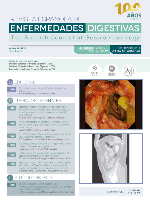
REVISTA ESPANOLA DE ENFERMEDADES DIGESTIVAS
Pioneering research for a healthier digestive future.REVISTA ESPANOLA DE ENFERMEDADES DIGESTIVAS, a pivotal Open Access journal published by ARAN EDICIONES, S A, has been at the forefront of advancing the field of gastroenterology since its inception in 1990. With a robust commitment to disseminating high-quality research, the journal provides a platform for researchers, clinicians, and students to share innovative findings and insights concerning digestive diseases. The journal is characterized by its Q3 ranking in both Gastroenterology and Miscellaneous Medicine categories, indicative of its significant contributions to these fields, and is positioned within the 36th percentile of Scopus rankings for medicine related to gastroenterology. Based in Spain, REVISTA ESPANOLA DE ENFERMEDADES DIGESTIVAS has embraced the Open Access model since 2004, ensuring that its articles are readily available to a global audience without financial barriers. The journal not only supports academic discourse but also plays a crucial role in improving clinical practices and health outcomes related to digestive health.

Canadian Journal of Gastroenterology and Hepatology
Connecting Researchers and Practitioners in Digestive HealthCanadian Journal of Gastroenterology and Hepatology, published by HINDAWI LTD, serves as a vital resource in the fields of gastroenterology and hepatology. Since its inception in 1987, this open-access journal has made significant contributions to advancing research and clinical practice through its comprehensive coverage of topics ranging from liver diseases to gastrointestinal disorders. With an impressive Q2 ranking in Gastroenterology and a Q3 ranking in Hepatology as of 2023, the journal has established itself as an influential platform for researchers and healthcare professionals seeking to disseminate and acquire knowledge. The journal is based in Egypt, with its operational headquarters located in London, England. Notably, it holds a respectable standing in Scopus rankings, placed at Rank #64 in Gastroenterology and Rank #34 in Hepatology, reflecting its impact and relevance in the medical community. With a commitment to quality and accessibility, the Canadian Journal of Gastroenterology and Hepatology continues to foster innovation and collaboration among its readers.

Translational Gastroenterology and Hepatology
Fostering Global Collaboration in Gastrointestinal Science.Translational Gastroenterology and Hepatology, published by AME Publishing Company, stands as a pivotal platform for advancing the understanding and treatment of gastrointestinal and liver diseases. With its focus on translational research, this journal aims to bridge the gap between laboratory discoveries and clinical applications, thus fostering improvements in patient care. Although specific metrics like H-Index and Scopus ranks are currently unavailable, the journal is committed to maintaining high standards of scholarly communication and excellence. As an open-access publication, it ensures that valuable findings are readily accessible to a global audience, promoting collaboration and innovation among researchers, clinicians, and healthcare professionals invested in gastroenterology and hepatology. The journal's dedication to disseminating groundbreaking research makes it an essential resource for those seeking to stay at the forefront of these ever-evolving fields.

Hepatology International
Exploring the frontiers of liver disease understanding.Hepatology International is a premier academic journal dedicated to advancing the field of liver research and hepatology. Published by SPRINGER, this journal boasts a prestigious Q1 ranking in Hepatology as of 2023, underscoring its commitment to high-quality research dissemination. The journal’s scope encompasses a wide range of topics related to liver disease, including clinical, translational, and basic science studies. With its impact factor reflecting its relevance and influence in the field, Hepatology International serves as an essential resource for researchers, clinicians, and students aiming to keep abreast of the latest developments and breakthroughs. Though traditionally a subscription-based journal, it offers a vast array of insightful articles that contribute significantly to our understanding of hepatological conditions. The journal continues its trajectory of growth since its inception in 2008, anticipating a convergence of knowledge and innovation through to 2024. Located in the heart of New York City, this journal not only represents a crucial platform for global hepatology research but also fosters a collaborative community of experts dedicated to improving liver health worldwide.
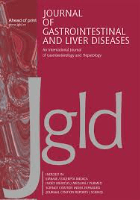
Journal of Gastrointestinal and Liver Diseases
Championing Comprehensive Understanding in GastroenterologyThe Journal of Gastrointestinal and Liver Diseases, published by MEDICAL UNIV PRESS in Romania, serves as a pivotal platform for the dissemination of significant research in the fields of gastroenterology and hepatology. Established in 2006, this journal has evolved over the years, currently holding a Q3 rank in Gastroenterology and a Q2 rank in Medicine (miscellaneous), reflecting its commitment to high-quality scholarship and impactful contributions to medical science.
With an ISSN of 1841-8724 and an E-ISSN of 1842-1121, the journal engages a diverse readership of researchers, clinicians, and students passionate about advancing knowledge in gastrointestinal and liver health. While it currently does not operate under an open access model, the journal remains a vital resource for those seeking to stay updated on the latest developments and emerging trends in the field. As it converges towards a broader impact, projected through its coverage until 2024, the Journal of Gastrointestinal and Liver Diseases continues to contribute to the academic landscape, encouraging innovation and comprehensive understanding in digestive health.